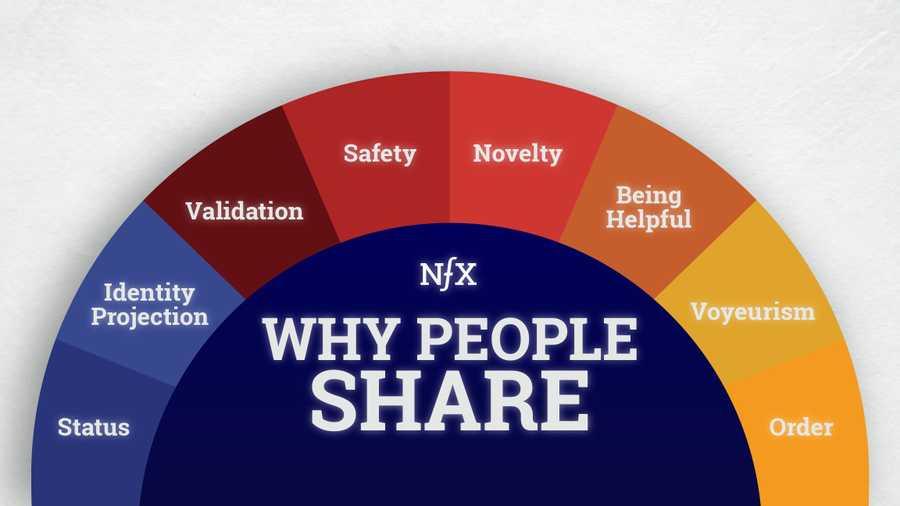Explore the World's Best Ideas
Join today and uncover 100+ curated journeys from 50+ topics. Unlock access to our mobile app with extensive features.
8 Reasons Things Go Viral
The psychology testing website was dedicated to combing through data on its 150 million users to figure out what motivates people to share things.
Here are 8 motivations that trigger sharing:
- Status
- Identity
- Being helpful
- Safety
- Order
- Novelty
- Validation
- Voyeurism
32
208 reads
1. Status
Also known as belonging, prestige, respect, scarcity...
People show it by associating themselves with other high-status people or by joining products that are exclusive.
Access to something scarce motivates people to share because they can get high status from the people they share it with and it makes them look cool by association.
Scarcity typically works more easily for things like discounts or tickets that are limited in number or time.
23
101 reads
2. Identity
This motivation is especially visible on social media, when sharing an outraged review or Facebook post helps them define what they stand against, and by implication what they stand for.
People want to be part of the pack, and when they share, it is sometimes to either signal that they belong or help them find their tribe.
Many products can build tribal network effects. Sharing about these products helps to recruit, signal membership, or to defend their tribe - and thus themselves - from others.
26
97 reads
3. Being Helpful
People are compelled to share things that they find useful because they want to be perceived as helpful and nurturing to their tribes.
Whether that be a new product that improves lives by producing a lot of value or something that produces that value at a lower price.
Language is important here. Make it easy to express the utility of your product in a clear, pithy, and compelling way.
It’s the difference between saying "Access an online rideshare marketplace" and "Get a ride in 3 minutes."
22
48 reads
4. Safety
Any perceived threat to safety - physical, financial, or emotion - can be a powerful reason why people share.
News media know this well: "If it bleeds, it leads."
Products that offer safety or security are shared because of the same emotions. Users share with their friends and family to help protect them from dangers.
Related to safety is compliance — people are highly motivated to prevent harm and maintain stability.
25
89 reads
5. Order
Some people just cannot abide chaos and will share anything that promises to make the world a bit more neat and tidy.
People share them not only because it makes others perceive them as more organized and efficient, but also because it helps them bring other people into the same protocol of organization - whether it be co-workers or friends and acquaintances.
Tools like Notion and Asana have benefited from a need to evangelize orderliness and drive mess from the world.
22
68 reads
6. Novelty
The attraction of novelty was identified early on by Wilhelm Wundt who came up with the Wundt curve.
The sweet spot is in the middle - we're attracted by things that are new enough to not be stale, but not too new to be strange.
Thus, people are motivated to share new products and new information because it makes them look like they’re ahead of the (Wundt) curve.
Competition makes entertainment virality difficult to catch. It’s very hit or miss and then fleeting even when you do hit.
24
48 reads
7. Validation
People share because they want to get a boost, believe they are good, believe they’re smart, or believe they’re worthy. They want to feel positive about themselves and their place in the world.
If you can reassure them of this and offer a way to project their essentially goodness to the world without seeming like annoying braggarts, you will do quite well.
23
74 reads
8. Voyeurism
There are two related motivations that cause people to share out of voyeurism.
Vicarious enjoyment. People share things that allow others to live through them - instagramming food and vacations or sharing a product unboxing on YouTube.
Schadenfreude. People are highly motivated to share things like celebrity scandals, gossip about high-profile people or people they don’t like.
It’s two sides of the same coin. Voyeurism is a powerful motivation in why people share.
23
67 reads
IDEAS CURATED BY
Denis Rasulev's ideas are part of this journey:
Learn more about personaldevelopment with this collection
How to write an effective resume
How to network and make connections
How to prepare for a job interview
Related collections
Similar ideas
2 ideas
The Psychology of Excitement: How to Better Engage Your Audience
blog.hubspot.com
13 ideas
Top 10 Viral Marketing Examples
startuptalky.com
Read & Learn
20x Faster
without
deepstash
with
deepstash
with
deepstash
Personalized microlearning
—
100+ Learning Journeys
—
Access to 200,000+ ideas
—
Access to the mobile app
—
Unlimited idea saving
—
—
Unlimited history
—
—
Unlimited listening to ideas
—
—
Downloading & offline access
—
—
Supercharge your mind with one idea per day
Enter your email and spend 1 minute every day to learn something new.
I agree to receive email updates


